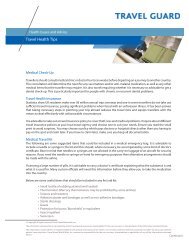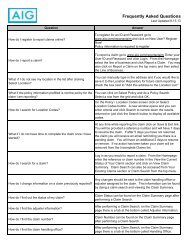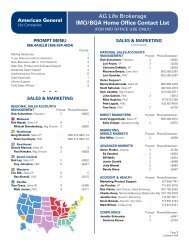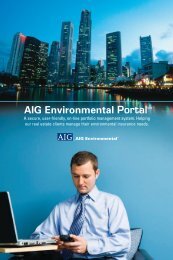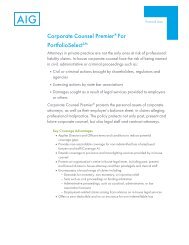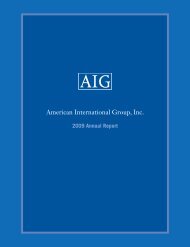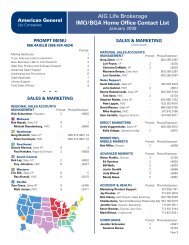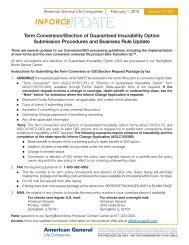fully interactive pdf - AIG.com
fully interactive pdf - AIG.com
fully interactive pdf - AIG.com
- No tags were found...
You also want an ePaper? Increase the reach of your titles
YUMPU automatically turns print PDFs into web optimized ePapers that Google loves.
How to Build a Multinational ProgramCompliancea Multinational’s Regulatory and Premium tax RequirementsPrinciples of extraterritoriality and international law dictate that the laws of a particular jurisdiction generally applyto conduct within its borders or by its nationals. Multinationals have offices, operations, subsidiaries, affiliates, assetsand people around the world. Because foreign laws generally apply to parties operating in-country, a multinational’spresence in a foreign country may subject it to some or all ofthat country’s regulatory requirements. Certain countries havelaws and/or regulations that may, with varying degrees ofclarity and specificity, indicate that in-country exposures becovered by a carrier that is licensed to conduct business inthat country. These mandates may take the form of aprohibition, an affirmative requirement, or both. They may bespecific to a particular type(s) of insurance, apply only to<strong>com</strong>pulsory insurance, or apply to all insurance, <strong>com</strong>pulsoryor discretionary. Some of these mandates may expressly statethe party(ies) to which they apply, i.e., brokers, insureds orcarriers resident in the country, whereas others may not. Thespecific requirements vary country to country.If a given country clearly requires local operations to becovered by a local policy issued by a locally licensed carrier,then a multinational’s local subsidiary — because it isresident in that country and thus subject to local regulation— may be at risk of violating such mandate if it is covered bythe parent’s global policy, transacted outside the country byits parent, and issued by a foreign carrier. The localsubsidiary, as an in-country resident, may also be required tocalculate and settle local premium taxes itself, and failure todo so could result in penalties and interest.a hypothetical to consider:Compliance QuestionsWhen crafting a program for multinationalexposures, consider:– Does local law require the local subsidiaryto purchase and/or be covered byinsurance from a locally licensed carrier?– Does local law prohibit the local subsidiaryfrom purchasing and/or being covered byinsurance from a carrier not locallylicensed?– Will the parent <strong>com</strong>pany charge the localsubsidiary for the allocated premium?– Will the local subsidiary take a taxdeduction for the allocated premium?– Will the local subsidiary need to paypremium tax in-country?An Australian-based multinational has a global professional indemnity policy in its home country that covers the parent<strong>com</strong>pany and the worldwide operations of its affiliates. A high profile lawsuit has been brought in Europe against the<strong>com</strong>pany’s European subsidiary. The local European regulator determines that because the local subsidiary is notcovered by a locally licensed carrier, it is violating local regulations, which prohibit entities or residents from purchasingor having coverage for local risks from carriers outside the country. The regulator assesses fines and penalties againstthe local operation, and renders the <strong>com</strong>pany’s global insurance policy void in the local jurisdiction, leaving it withoutcoverage for the lawsuit.In addition, the local tax authority learns that premium tax was not paid in connection with the global policy issued inAustralia. Since the subsidiary resides within the tax authority’s purview, the tax authority sends it an assessment for backtaxes based on the premium it believes should have been charged for local coverage, plus accrued interest. The local taxauthority also determines that the subsidiary was charged by its Australian parent <strong>com</strong>pany for the portion of the globalpolicy premium attributable to the subsidiary’s risks, and took a tax deduction for the premium expense. The deduction isdisallowed, and additional fines and penalties are imposed.4



